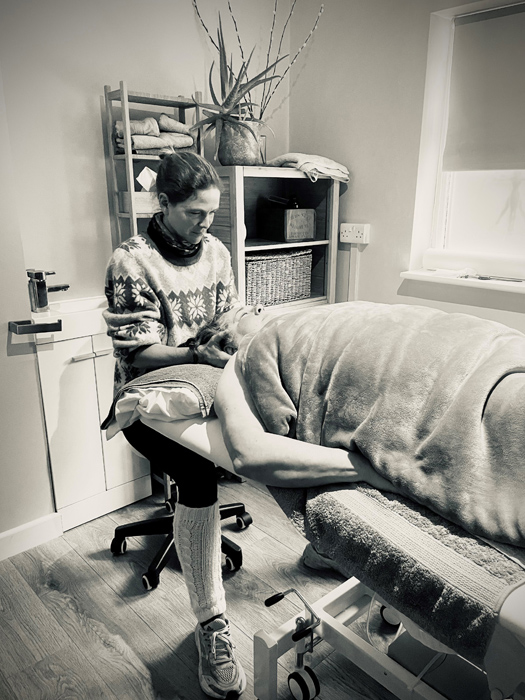We support and treat a broad range of chronic conditions, as well as treating clients experiencing the sudden onset of acute pain through injury or trauma. With you for your here & now and for your long horizons.
We support and treat a broad range of chronic conditions, as well as treating clients experiencing the sudden onset of acute pain through injury or trauma. With you for your here & now and for your long horizons.
MANAGING CHRONIC & LONG-TERM CONDITIONS
Neurological Physiotherapy
Neurological Physiotherapy (neuro physio) is a specialist area of therapy that works with people who either have long-term degenerative neurological conditions or have experienced trauma involving injury to their central nervous system. It differs from traditional physiotherapy by harnessing the brain’s incredible ability to form new synaptic connections through repetition of movement, working in a specific way to develop neuro-muscular pathways to improve function. Our specific specialisms in this area is in supporting ambulating clients with suspected or previously diagnosed neurological issues or conditions relating to Multiple Sclerosis (MS), Parkinson’s Disease, and Stroke Recovery.
Our senior physiotherapists treat clients using a combination of neuro physio, traditional physio (including hands-on manipulation), and accessible machine-based Pilates exercises to assist or resist movement depending on individual needs. We aim to help improve balance, coordination, and use of limbs as well as strengthen muscles, improve mobility, regain function, and promote improved or continued independence for as long as possible.
Your journey towards better/prolonged function or rehabilitation (partial or full) begins with a full assessment. During this session, we will ask you lots of questions about yourself, your condition, any treatments that you may have tried previously, and what you hope to achieve. The assessment focuses on the nervous system to assess and identify any abilities and limitations that may affect function and activities associated with daily living. This should allow our clinical team to create individual, patient-centered goals and ultimately a tailor-made treatment plan based on your needs to support you in the short, medium, and long-term.



MANAGING CHRONIC & LONG-TERM CONDITIONS
Vestibular Physiotherapy
Vestibular Physiotherapy is a specialist area of rehabilitation therapy. If you are experiencing difficulties with your balance and have symptoms of dizziness or vertigo, a detailed assessment of all the components of your balance mechanisms (including the vestibular system) will help to establish the possible cause of your symptoms and then the most appropriate treatment intervention and development of a focused exercise programme.
One of the causes of a vestibular disorder is Benign Paroxismal Positional Vertigo (BPPV) which occurs when crystals that form part of the sensory apparatus in our ears are displaced. This results in feelings of intense dizziness when the head is moved in certain positions. A thorough assessment of those movements which provoke your symptoms will guide treatment, which may include a repositioning technique (such as the Epley or Sermont) and will almost certainly include a targeted exercise programme (including head and eye movements, balance retraining and self-repositioning techniques) to follow at home. It is essential not to avoid those movements that are provocative of symptoms, and so exercises will normally aim to reproduce your symptoms. This works to retrain the brain to manage the movements, actions, and environments that provoke your symptoms and therefore increase your confidence and reduce the restrictions on daily life that can be caused by the feelings of vertigo or dizziness.
Symptoms of vertigo and a reduction in balance can be secondary to a virus or an infection so recovery from these primary causes is necessary and may require medical treatment. These symptoms could also be coming from the central nervous system (such as following a stroke or a head injury) or could be cardiac in origin, in which case you will require medical attention to determine the appropriate treatment path.
OTHER LONG-TERM & CHRONIC CONDITIONS
We offer specialist support and treatment across a broad range of chronic musculoskeletal, autoimmune, genetic, cardiac, stress-related and inflammatory conditions.
.
“A friend suggested I try CorefitPhysio nearly 7 years’ ago. I had recently suffered from a severe case of sciatica which had badly damaged the nerves in one of my legs. I also have scoliosis which, whilst doesn’t cause me any pain, means I am out of kilter. I have never looked back.”

BOOK AN ASSESSMENT
Having more movement in your joints than is normal (hypermobility) can create vulnerability to injury as well and contributing to pain through swollen joints, tendon tears or dislocation. After fully assessing the extent of your condition, we aim to strengthen the tissue around the joints to give more support, working with you to develop a tailored plan of strengthening and stretching exercises through a combination of hands-on treatment and Pilates based exercise. Pilates is the ideal treatment for this condition, with regular practice allowing you to remain active and enjoy all aspects of your life.

BOOK AN ASSESSMENT
A tailored physio-led strengthening and stretching programme can greatly help in managing scoliosis. Our aim is to oppose the curvature of the spine, stopping its progression and over time potentially reducing the curve. Our senior physiotherapists will treat you through a combination of hands-on treatment and exercise to mobilise tight structures and strengthen others. A vital part of this process is self-correction, we work with you develop your understanding of your body, what to strengthen, what to stretch, and how. We provide you with a personalised plan to help you self-correct your posture to the best of your ability in everyday life. equipping you with tools for life.

BOOK AN ASSESSMENT
It is very important to try and keep active when you have arthritis; joints are designed to move and inactivity weakens the muscles. Our physio team will support and guide you on reaching the right balance between activity and rest, how to exercise safely and effectively both at home and in physio-led Pilates classes, approaches to managing your pain, and provide you with hands-on treatment to relax muscles, help improve the range of movement in a joint and reduce stiffness and pain.

BOOK AN ASSESSMENT
Physiotherapy can greatly improve the quality of life for people with cancer, both during and after treatment. Our physio team can work with you to devise a care plan and help you find the best way to be active and manage your pain. Determined by you and your condition, a tailored plan will be developed combining hands-on treatment and Pilates-based exercise. We aim to help you gain strength and mobility whilst reducing some of the side effects you may be experiencing such as tiredness, osteoporosis, and lymphoedema.

BOOK AN ASSESSMENT
Physio-led cardiac rehabilitation is proven to be clinically effective in reducing mortality, improving health and quality of life, and reducing the risk of hospital readmission. Safely engaging in exercise is an essential component of your recovery and rehabilitation if you have experienced conditions such as angina, heart attack, or stroke. We are skilled in supporting clients to progress towards embracing a physio-led Pilates-based exercise programme, developing tailored lifestyle improvement plans aimed at improving outcomes.

BOOK AN ASSESSMENT
Specialist Physiotherapy is an effective treatment to help relieve some of the pain and stiffness associated with fibromyalgia. Following a detailed assessment, we will work with you with the aim of developing an approach to help reduce muscle spasms, increase energy levels, improve pain management and sleep patterns through a combination of hands-on treatment and tailored exercise.

BOOK AN ASSESSMENT
If you suffer from systemic lupus erythematosus (SLE) our specialist physio team can assess and work with you to develop a tailored treatment aimed at restoring physical function, improving your mobility, relieving pain through increased flexibility and range of movement driving towards strength, balance, coordination, and endurance.

BOOK AN ASSESSMENT
Physiotherapy is one of the most important measures for the treatment of CRPS. We aim to develop a goal-based plan with you to desensitise the affected area, improve flexibility and isometric strength, develop correct posture, and work towards stress loading and aerobic conditioning with the aim of reducing pain and maximise good movement.

BOOK AN ASSESSMENT
Living with Long Covid or post-viral chronic fatigue can be incredibly debilitating and unpredictable. Our specialist physiotherapy can help you to develop tolerance to exercise whilst improving breathing patterns. Through a tailored programme of planning, pacing and prioritising your activity and relaxation, and though gentle breathing retraining, we aim to build slow and progressive improvement.

BOOK AN ASSESSMENT

BOOK AN ASSESSMENT

BOOK AN ASSESSMENT

PHYSIOTHERAPY FOR ACUTE PAIN
Let our expert Physio team help alleviate your sudden onset pain and get you back on track
Acute pain is short in duration (typically up to 3 months after which it becomes chronic) and is your body’s way of saying that something is or might become damaging to you. It usually comes on suddenly, lasts a relatively short time, and normally resolves when the body heals itself of its own accord, for instance after injuries or operations, or after successful treatment. Acute musculoskeletal pain can typically be classified as the sudden onset of joint pain, muscle pain, tendon, ligament pain, or bone pain, typically accompanied by swelling, heat, soreness to touch and/or soreness with movement.
Examples of acute pain include:
- Bone centred pain caused by fracture or bony bruising from a fall, collision or wrench.
- Joint pain, if its onset is sudden and as a result of overload, sporting injury or if it is of rapid onset with unknown cause.
- Muscle spasm, strain or tear is a common cause, often as a result of a fall or injury, but also common from sustained poor posture.
- Nerve pain can be caused by nerves being squeezed or impinged and as with muscle spasm and joint pain may not be traced back to an exact incident, but may be caused by prolonged sitting or sleeping in an uncomfortable position.
- Acute back pain with or without leg pain, sprained ligaments from rolling an ankle and sudden tendon tears or inflammation from an increase in a particular activity.
If you are in acute pain, our expert physio team can begin to help you straight away. Your journey out of pain and to restored function begins with a full biomechanical assessment. During this session, we will take a full history of your condition, look at your movement and restrictions, assess you using Pilates exercises and/or hands-on techniques, explain our findings, and begin hands-on physiotherapy to treat you as appropriate. Your physiotherapist will discuss a treatment plan with you and you will leave the practice with a clear view of what you should and should not be doing at home, a set of exercises if appropriate, and a clear expectation of what to expect in the coming days and in preparation for your next session.




